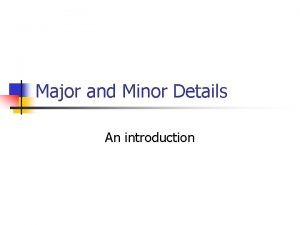A catalogue of material to support CCGs GP






- Slides: 6

A catalogue of material to support CCGs, GP practices and others to undertake initiatives to support STOMP www. england. nhs. uk/stomp

Introduction In December 2012, the Department of Health (DH) publication “Transforming Care: A national response to Winterbourne View Hospital” stated that: “ 7. 31 We have heard deep concerns about the over-use of antipsychotic and antidepressant medicines. Health professionals caring for people with learning disabilities should assess and keep under review the medicines requirements for each individual to determine the best course of action for that patient, taking into account the views of the person wherever possible and their family and/or carer(s). Services should have systems and policies in place for that patient to ensure that this is done safely and in a timely manner and should carry out regular audits of medication prescribing and management, involving pharmacists, doctors and nurses” An advice letter from Keith Ridge (Chief Pharmaceutical Officer) and Dominic Slowie (National Clinical director for learning disabilities) on the use of medicines in people with learning disabilities ( https: //www. england. nhs. uk/wpcontent/uploads/2015/07/med-advice-ld-letter. pdf) announced the intention to undertake a ‘Call to Action’ to improve the situation. Following discussions with stakeholders concerns were raised about the use of other psychotropic drugs for people with a learning disability, autism or both. This included benzodiazepine anxiolytics, hypnotics, antimanics including antiepileptics, and stimulants. The scope of the STOMP campaign was extended to include all psychotropic drugs. www. england. nhs. uk/stomp

The launch of the ‘Call to Action’ Stopping Overmedication of People with a Learning Disability, Autism or Both (STOMP) On June 1 st 2016 together with the Minister for Care, Alistair Burt the STOMP Learning Disabilities, Autism or Both pledge was signed at a summit in London by: • • • Royal Colleges of Nursing, Psychiatrists and GPs Royal Pharmaceutical Society British Psychological Society NHS England The Minister Alistair Burt The Challenging Behaviour Foundation (CBF) also supported the pledge Guidance for prescribers and others The signing of the pledge accompanied the launch of a guidance document for GPs and other prescribers developed by NHS England in collaboration with the above organisations (https: //www. england. nhs. uk/wpcontent/uploads/2017/07/stomp-gp-prescribing-v 17. pdf) In addition the Royal College of Psychiatrists issued guidance for psychiatrists called ‘Psychotropic Drug Prescribing for People with Intellectual Disabilities, mental health problems and/or behaviours that challenge’ https: //www. rcpsych. ac. uk/pdf/FR_ID_09_for_website. pdf www. england. nhs. uk/stomp

National Institute of Care and Health Excellence (NICE) guidance NICE Guidance NG 11 - Challenging behaviour and learning disabilities: prevention and interventions for people with learning disabilities whose behaviour challenges. (https: //www. nice. org. uk/guidance/ng 11) provides the following advice: Consider antipsychotic medication to manage behaviour that challenges only if: • • • psychological or other interventions alone do not produce change within an agreed time or treatment for any coexisting mental or physical health problem has not led to a reduction in the behaviour or the risk to the person or others is very severe (for example, because of violence, aggression or self-injury) Only offer antipsychotic medication in combination with psychological or other interventions. Further information about STOMP For further information about the STOMP campaign and up to date information go to the NHS England website (https: //www. england. nhs. uk/learningdisabilities/improving-health/stomp/ ) STOMP is also on Twitter at #We. Support. Stomp www. england. nhs. uk/stomp

Advice for people with a learning disability and their carers An easy read document providing advice to patients, carers and others is available on the NHS England website https: //www. england. nhs. uk/wpcontent/uploads/2015/07/ld-med-advice-easy-read. pdf The Voluntary Organisations Disability Group (VODG) has a variety of support tools on their website aimed at social care (https: //www. vodg. org. uk/campaigns/stompcampaign/) and support material devised by a large provider of social care -CMG(Care Management Group) (http: //cmg. co. uk/wp-content/uploads/2017/06/STOMP-Guide-Final-version. pdf) These include a document called ‘Preparing to visit a doctor to talk about psychotropic medication’ (https: //www. vodg. org. uk/publications/preparing-to-visita-doctor-to-talk-about-psychotropic-medication/). This resource is a guide for a support worker who is accompanying a person with a learning disability, autism or both to a GP consultation appointment to talk about psychotropic medication. It has been produced as part of the STOMP healthcare campaign. The Challenging Behaviour Foundation have produced a ‘Medication Pathway’ (http: //medication. challengingbehaviour. org. uk/ ). The pathway designed as a resource for family carers is comprised of a number of sections – Introduction, Medication facts and National Guidance, Medication has been suggested, challenging the decision to prescribe medication, when medication is being started, ongoing use of medication: monitoring and reviewing and Getting it right. MOOC module 3 when completed – DB to check with DG www. england. nhs. uk/stomp

Case examples A number of case examples are available on Care transformed https: //www. england. nhs. uk/learning-disabilities/caretransformed/ Videos Derbyshire Healthcare Foundation Trust have produced a series of 5 videos about STOMP (https: //www. youtube. com/playlist? list=PL 4 sh. ZXQ 9 Yqm. IFPJX 02 IWJvh. Hqdr. Mf_E k. O). These include videos for GPs, psychiatrists, carers, pharmacists and the learning disabilities team A Positive Behavioural Support (PBS) awareness video is available at: (https: //www. youtube. com/watch? v=1 l 4 Il 65 Wy. W 8) Alternatives to psychotropic drugs Coventry and Warwickshire Partnership NHS Trust have produced a No Medication leaflet (14842_no-medication-cwpt-dl-6 pp-final-april-2018. pdf) The British Psychological Society have produced a document called ‘what can I do about Challenging Behaviour (https: //www 1. bps. org. uk/system/files/userfiles/DCP%20 The%20 Faculty%20 for%20 People%20 with%20 Intellectual%20 Dis abilities/public/STOMPleafletfinal. pdf) From the British Psychological Society Jan 18 Committee and Working Group Position Statement on Positive Behavioural Support (https: //www 1. bps. org. uk/system/files/userfiles/Division%20 of%20 Clinical%20 Psychology/public/REP 118%20 Positive%20 b ehaviour%20 ID 1961%20 WEB. pdf) and Psychological Therapies and People who have Intellectual Disabilities (https: //www 1. bps. org. uk/system/files/Public%20 files/id_therapies. pdf) www. england. nhs. uk/stomp











